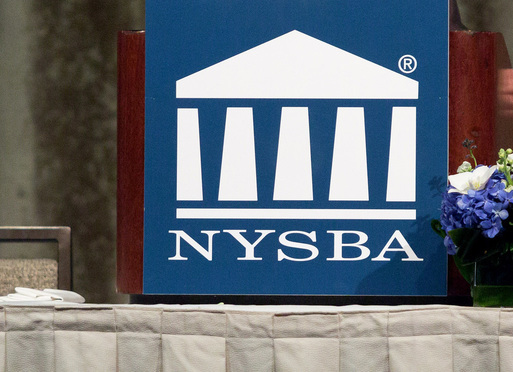Discovery Reform Tops State Bar's 2018 Legislative Priorities
The bar is calling for a substantial overhaul to the state's discovery-related laws, as well as changes to power of attorney procedures and other priorities for state and federal legislators.
November 27, 2017 at 06:00 AM
7 minute read

The New York State Bar Association wants the Legislature to take up changes to criminal discovery practices when it reconvenes in January.
Discovery reform is one of a number of legislative agenda items the bar has identified for both state and federal legislators to address in 2018. Bar president Sharon Stern Gerstman said she's hoping to see the organization's priorities get turned into law.
“We've gone through a very careful process to pick issues that we think are of great import to our members and to the citizens of New York,” she said. “We'll be using our resources—our legislative resources, our staff—and our leaders to see if we can have the same success this year that we had last year.”
The bar's support for a right to discovery in criminal matters comes amid greater scrutiny of—and action on—an issue defense attorneys have long argued is unfair to clients and damaging to the criminal justice system.
The Legal Aid Society's Attorney-in-Chief Seymour James Jr. praised the bar association's move in a statement, welcoming it into “a growing and diverse coalition of voices calling for the law's overhaul.”
“New York's current discovery statute is antiquated, unjust, and patently unfair, and facilitates wrongful convictions and unnecessary court delays,” James said in a statement. “More and more New Yorkers see this issue as a critical criminal justice reform and are urging Albany to act.”
Recently, the state court system itself took measures to address the issue. The Office of Court Administration, at the behest of Chief Judge Janet DiFiore, directed judges earlier this month to issue orders to prosecutors to ensure information is disclosed in a more timely fashion, such as 15 days before a suppression hearing or 30 days before a felony trial.
While defense attorneys have largely been appreciative of the move, it's been seen by many as a Band-Aid. The bar association seeks a more substantive overhaul of the state's discovery laws regarding, among other things, pretrial motions, securing witnesses by subpoena and evidence suppression.
“If you look around the country, New York is one of the very few states that has such a paltry amount of discovery that's afforded to criminal defendants in criminal proceedings,” Gerstman noted.
The bar hopes to see changes to rules to modernize and to make the criminal discovery rules and process fairer, while providing measures to ensure the safety of witnesses—a requirement for potential buy-in from prosecutors.
On top of discovery reform, the bar association is also pushing for reform to the statutory power of attorney. A simplified form, new protections against third parties' refusal to accept valid powers, protections for those following the proper process, and a lining up for language in forms with statutory language are all goals.
Additionally, the bar seeks legislative confirmation that communications with clients through lawyer referral services is privileged, as well as perennial calls for an adequately funded judiciary, including a call for the end to the so-called judicial pension “death gamble.”
Gerstman said the bar hopes it can continue the success it saw last year.
“We had a home run last year,” she said, noting the passage of priorities such as raise-the-age, records sealing, and full funding for indigent services legislation. Power of attorney legislation also “came pretty close” last year after passing the Assembly, and the bar president said they hope to have worked out issues with the legislation to gain enough support to pass both chambers this year.

The
Discovery reform is one of a number of legislative agenda items the bar has identified for both state and federal legislators to address in 2018. Bar president Sharon Stern Gerstman said she's hoping to see the organization's priorities get turned into law.
“We've gone through a very careful process to pick issues that we think are of great import to our members and to the citizens of
The bar's support for a right to discovery in criminal matters comes amid greater scrutiny of—and action on—an issue defense attorneys have long argued is unfair to clients and damaging to the criminal justice system.
The Legal Aid Society's Attorney-in-Chief Seymour James Jr. praised the bar association's move in a statement, welcoming it into “a growing and diverse coalition of voices calling for the law's overhaul.”
“
Recently, the state court system itself took measures to address the issue. The Office of Court Administration, at the behest of Chief Judge Janet DiFiore, directed judges earlier this month to issue orders to prosecutors to ensure information is disclosed in a more timely fashion, such as 15 days before a suppression hearing or 30 days before a felony trial.
While defense attorneys have largely been appreciative of the move, it's been seen by many as a Band-Aid. The bar association seeks a more substantive overhaul of the state's discovery laws regarding, among other things, pretrial motions, securing witnesses by subpoena and evidence suppression.
“If you look around the country,
The bar hopes to see changes to rules to modernize and to make the criminal discovery rules and process fairer, while providing measures to ensure the safety of witnesses—a requirement for potential buy-in from prosecutors.
On top of discovery reform, the bar association is also pushing for reform to the statutory power of attorney. A simplified form, new protections against third parties' refusal to accept valid powers, protections for those following the proper process, and a lining up for language in forms with statutory language are all goals.
Additionally, the bar seeks legislative confirmation that communications with clients through lawyer referral services is privileged, as well as perennial calls for an adequately funded judiciary, including a call for the end to the so-called judicial pension “death gamble.”
Gerstman said the bar hopes it can continue the success it saw last year.
“We had a home run last year,” she said, noting the passage of priorities such as raise-the-age, records sealing, and full funding for indigent services legislation. Power of attorney legislation also “came pretty close” last year after passing the Assembly, and the bar president said they hope to have worked out issues with the legislation to gain enough support to pass both chambers this year.
This content has been archived. It is available through our partners, LexisNexis® and Bloomberg Law.
To view this content, please continue to their sites.
Not a Lexis Subscriber?
Subscribe Now
Not a Bloomberg Law Subscriber?
Subscribe Now
NOT FOR REPRINT
© 2025 ALM Global, LLC, All Rights Reserved. Request academic re-use from www.copyright.com. All other uses, submit a request to [email protected]. For more information visit Asset & Logo Licensing.
You Might Like
View All
New York-Based Skadden Team Joins White & Case Group in Mexico City for Citigroup Demerger

Bankruptcy Judge Clears Path for Recovery in High-Profile Crypto Failure
3 minute read
US Judge Dismisses Lawsuit Brought Under NYC Gender Violence Law, Ruling Claims Barred Under State Measure
Trending Stories
Who Got The Work
J. Brugh Lower of Gibbons has entered an appearance for industrial equipment supplier Devco Corporation in a pending trademark infringement lawsuit. The suit, accusing the defendant of selling knock-off Graco products, was filed Dec. 18 in New Jersey District Court by Rivkin Radler on behalf of Graco Inc. and Graco Minnesota. The case, assigned to U.S. District Judge Zahid N. Quraishi, is 3:24-cv-11294, Graco Inc. et al v. Devco Corporation.
Who Got The Work
Rebecca Maller-Stein and Kent A. Yalowitz of Arnold & Porter Kaye Scholer have entered their appearances for Hanaco Venture Capital and its executives, Lior Prosor and David Frankel, in a pending securities lawsuit. The action, filed on Dec. 24 in New York Southern District Court by Zell, Aron & Co. on behalf of Goldeneye Advisors, accuses the defendants of negligently and fraudulently managing the plaintiff's $1 million investment. The case, assigned to U.S. District Judge Vernon S. Broderick, is 1:24-cv-09918, Goldeneye Advisors, LLC v. Hanaco Venture Capital, Ltd. et al.
Who Got The Work
Attorneys from A&O Shearman has stepped in as defense counsel for Toronto-Dominion Bank and other defendants in a pending securities class action. The suit, filed Dec. 11 in New York Southern District Court by Bleichmar Fonti & Auld, accuses the defendants of concealing the bank's 'pervasive' deficiencies in regards to its compliance with the Bank Secrecy Act and the quality of its anti-money laundering controls. The case, assigned to U.S. District Judge Arun Subramanian, is 1:24-cv-09445, Gonzalez v. The Toronto-Dominion Bank et al.
Who Got The Work
Crown Castle International, a Pennsylvania company providing shared communications infrastructure, has turned to Luke D. Wolf of Gordon Rees Scully Mansukhani to fend off a pending breach-of-contract lawsuit. The court action, filed Nov. 25 in Michigan Eastern District Court by Hooper Hathaway PC on behalf of The Town Residences LLC, accuses Crown Castle of failing to transfer approximately $30,000 in utility payments from T-Mobile in breach of a roof-top lease and assignment agreement. The case, assigned to U.S. District Judge Susan K. Declercq, is 2:24-cv-13131, The Town Residences LLC v. T-Mobile US, Inc. et al.
Who Got The Work
Wilfred P. Coronato and Daniel M. Schwartz of McCarter & English have stepped in as defense counsel to Electrolux Home Products Inc. in a pending product liability lawsuit. The court action, filed Nov. 26 in New York Eastern District Court by Poulos Lopiccolo PC and Nagel Rice LLP on behalf of David Stern, alleges that the defendant's refrigerators’ drawers and shelving repeatedly break and fall apart within months after purchase. The case, assigned to U.S. District Judge Joan M. Azrack, is 2:24-cv-08204, Stern v. Electrolux Home Products, Inc.
Featured Firms
Law Offices of Gary Martin Hays & Associates, P.C.
(470) 294-1674
Law Offices of Mark E. Salomone
(857) 444-6468
Smith & Hassler
(713) 739-1250







